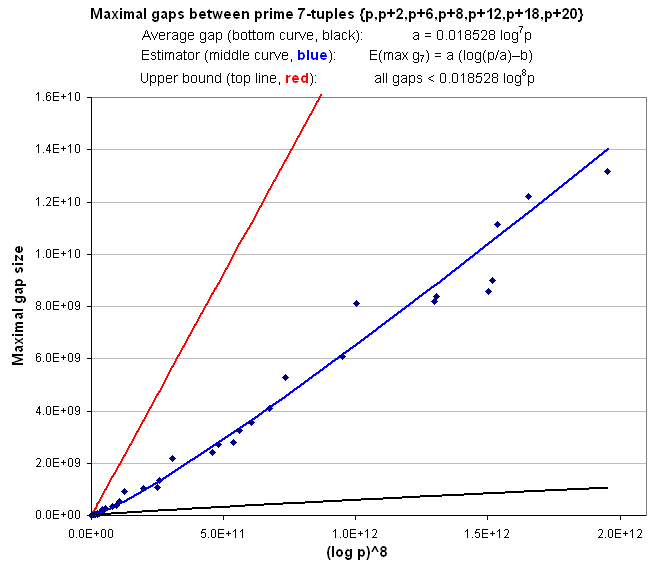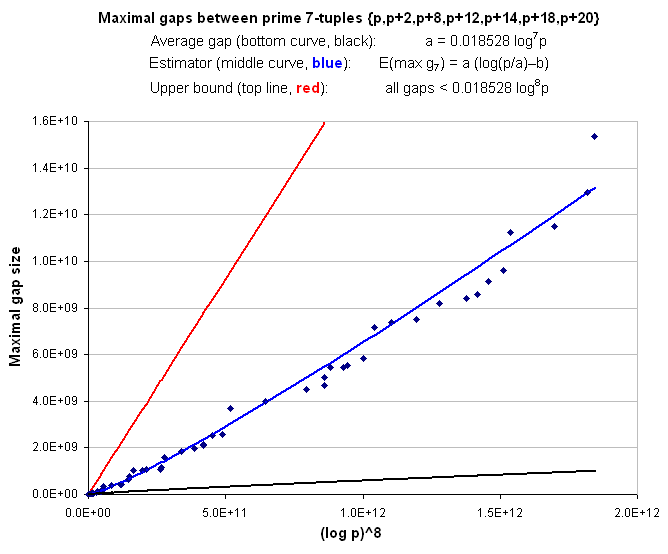The observed maximal gaps between prime septuplets near p are at most log p times the average gap.
The approximate size of a maximal gap that ends at p is given by the following empirical formula:
whereE(max g7(p)) = a(log(p/a) − 2/7) = O(log8p)
Maximal gaps between prime septuplets of each type are listed below.

Maximal gaps between prime septuplets {p, p+2, p+6, p+8, p+12, p+18, p+20}
1st septuplet: 2nd septuplet: Gap g7(p):
11 165701 165690
165701 1068701 903000
1068701 11900501 10831800
25658441 39431921 13773480
45002591 67816361 22813770
93625991 124716071 31090080
257016491 300768311 43751820
367438061 428319371 60881310
575226131 661972301 86746170
1228244651 1346761511 118516860
1459270271 1699221521 239951250
2923666841 3205239881 281573040
10180589591 10540522241 359932650
15821203241 16206106991 384903750
23393094071 23911479071 518385000
37846533071 38749334621 902801550
158303571521 159330579041 1027007520
350060308511 351146640191 1086331680
382631592641 383960791211 1329198570
711854781551 714031248641 2176467090
2879574595811 2881987944371 2413348560
3379186846151 3381911721101 2724874950
5102247756491 5105053487531 2805731040
5987254671311 5990491102691 3236431380
7853481899561 7857040317011 3558417450
11824063534091 11828142800471 4079266380
16348094430581 16353374758991 5280328410
44226969237161 44233058406611 6089169450
54763336591961 54771443197181 8106605220
154325181803321 154333374270191 8192466870
157436722520921 157445120715341 8398194420
281057032201481 281065611322031 8579120550
294887168565161 294896169845351 9001280190
309902902299701 309914040972071 11138672370
419341934631071 419354153220461 12218589390
854077393259801 854090557643621 13164383820

Maximal gaps between prime septuplets {p, p+2, p+8, p+12, p+14, p+18, p+20}
1st septuplet: 2nd septuplet: Gap g7(p):
5639 88799 83160
88799 284729 195930
284729 626609 341880
1146779 6560999 5414220
8573429 17843459 9270030
24001709 42981929 18980220
43534019 69156539 25622520
87988709 124066079 36077370
157131419 208729049 51597630
522911099 615095849 92184750
706620359 832143449 125523090
1590008669 1730416139 140407470
2346221399 2488117769 141896370
3357195209 3693221669 336026460
11768282159 12171651629 403369470
30717348029 31152738299 435390270
33788417009 34230869579 442452570
62923039169 63550891499 627852330
68673910169 69428293379 754383210
88850237459 89858819579 1008582120
163288980299 164310445289 1021464990
196782371699 197856064319 1073692620
421204876439 422293025249 1088148810
427478111309 428623448159 1145336850
487635377219 489203880029 1568502810
994838839439 996670266659 1831427220
1554893017199 1556874482069 1981464870
2088869793539 2090982626639 2112833100
2104286376329 2106411289049 2124912720
2704298257469 2706823007879 2524750410
3550904257709 3553467600029 2563342320
4438966968419 4442670730019 3703761600
9996858589169 10000866474869 4007885700
21937527068909 21942038052029 4510983120
29984058230039 29988742571309 4684341270
30136375346249 30141383681399 5008335150
32779504324739 32784963061379 5458736640
40372176609629 40377635870639 5459261010
42762127106969 42767665407989 5538301020
54620176867169 54626029928999 5853061830
63358011407219 63365153990639 7142583420
79763188368959 79770583970249 7395601290
109974651670769 109982176374599 7524703830
145568747217989 145576919193689 8171975700
196317277557209 196325706400709 8428843500
221953318490999 221961886287509 8567796510
249376874266769 249385995968099 9121701330
290608782523049 290618408585369 9626062320
310213774327979 310225023265889 11248937910
471088826892779 471100312066829 11485174050
631565753063879 631578724265759 12971201880
665514714418439 665530090367279 15375948840
The ratio g7(p)/log8p is never greater than 0.018528, i.e.
maximal gap sizes are less than log p times the average gap, where p is the prime at the end of the gap.
Copyright © 2011, Alexei Kourbatov, JavaScripter.net.